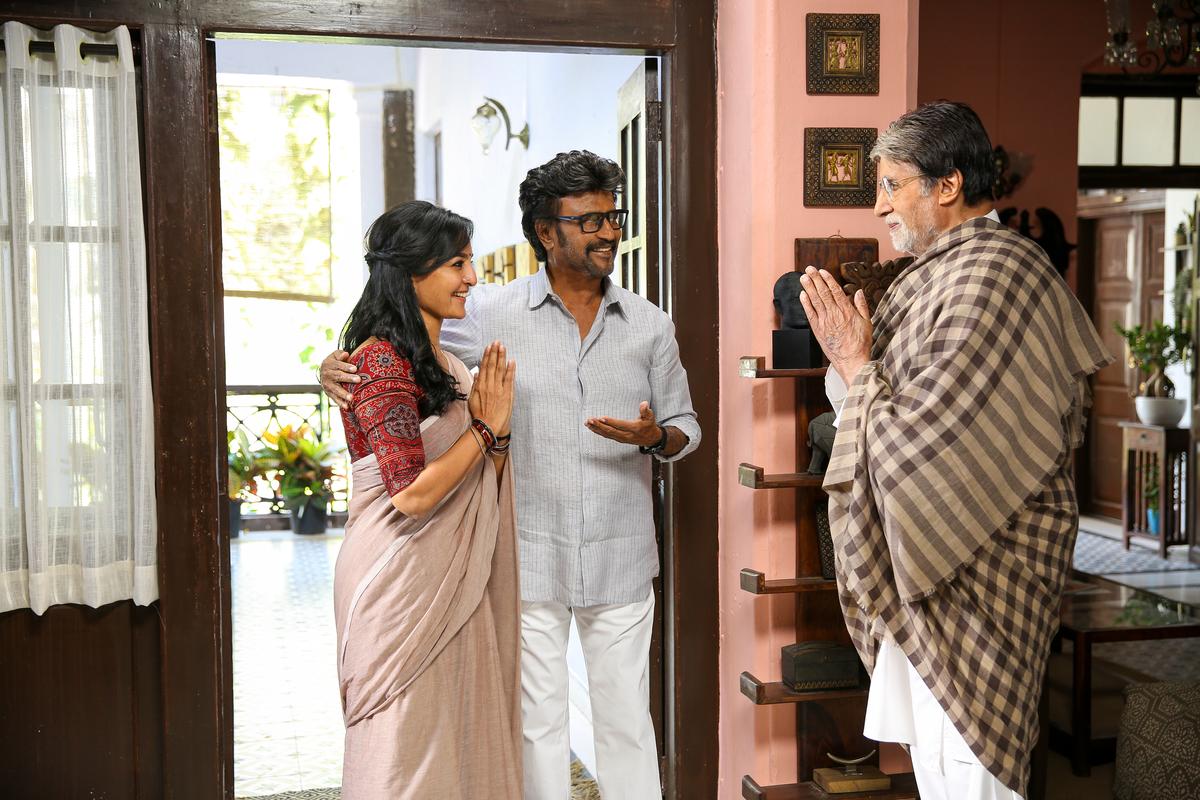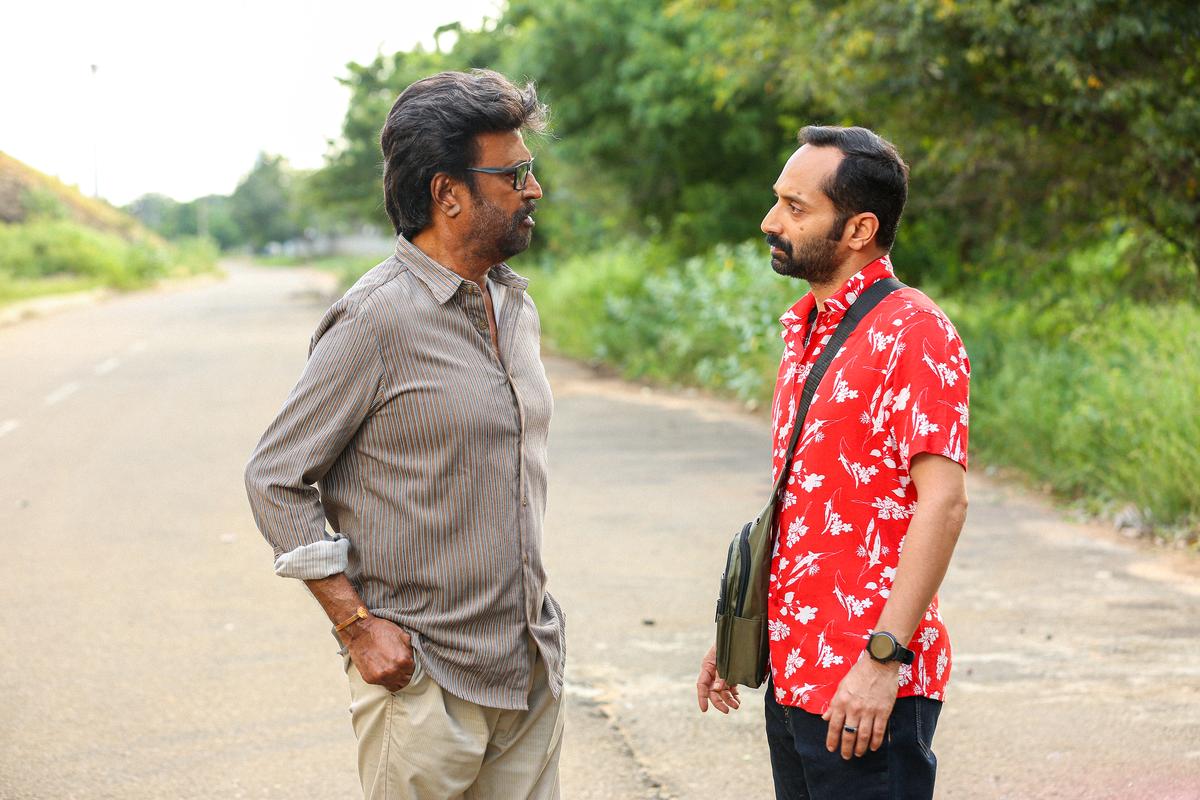Table of Contents

A still from ‘Vettaiyan’ and director TJ Gnanavel
| Photo Credit: Special Arrangement and Shiva Raj S
TJ Gnanavel is probably the only two-film-old filmmaker in recent times, apart from Pa. Ranjith, to helm a Rajinikanth-starrer; the filmmaker calls the experience of making the film — which also marks Amitabh Bachchan’s Tamil debut — rightfully “surreal”.
Calling it an exciting venture, Gnanavel says, “Doing a Rajini sir film is exciting and the addition of stars like Amitabh sir, Rana Daggubati and Fahadh Faasil, makes it more exciting. There’s also the responsibility to justify their presence in the film and I believe we have done a good job at it.”
Excerpts from the conversation:
How challenging was it to amalgamate your core idea into a Rajinikanth film?
There’s a 50-year pattern on how a Rajini sir film should be and one cannot break that mould. If you can embed your story within that pattern then that’s a win-win situation. The idea was to give an entertaining story without disappointing his fans.

I think terms like ‘mass’, ‘commercial’ and ‘message’ are approached from a narrow perspective. For example, Jai Bhim had mass scenes — not for Suriya sir but for Sengeni (Lijomol Jose). The scene where she walks out of the police station features a grand orchestration recorded in a Hollywood studio. It would have been a mass theatre moment had the film been released theatrically. I believe mass moments aren’t restricted to actors but also scenes. When you have someone like Rajini sir, such moments come in quite organically. With a body of work spanning over 50 years, such scenes come up naturally while writing the script itself. Also, irrespective of who is playing the lead, every film needs its heroic moments. The recent Lubber Pandhu didn’t have superstars, but it had moments created around its lead actors.

A still from ‘Vettaiyan’
| Photo Credit:
Special Arrangement
How was it to collaborate with your wife B Kiruthika on the film’s screenplay?
We decided to work together even before we got married; she worked on Jai Bhim’s screenplay as well. As far as collaborating with her is concerned, there’s no specific need to make her understand what I am thinking on the sets. During extensive schedules, I might have to stay on the sets the whole day and I don’t need to explain to my wife as she’ll also be beside me. We indulge in open discussions and thanks to her, I also get a fresh female perspective. She’s also a hardcore Rajini sir fan!
‘Kootathil Oruthan’ had a scene on custodial torture while ‘Jai Bhim’ was centred around the concept… now ‘Vettaiyan’ is also about a cop. What about the police force intrigues you?
Their world is subjected to a lot of criticism and I strongly feel it needs reform. Custodial torture has no place in a democratic, modern society and if it persists, it means we haven’t reached that level as a society. Custodial torture is illegal as well as ethically wrong. As I come from a journalism background, I have a broader perspective on it; I have met those who have experienced it and those experiences might reflect in my works.

At the film’s audio launch, Anirudh called ‘Vettaiyan’ very different from the kind of films he has done earlier. How did you work on the music of this film?
Today, Anirudh is the best when it comes to creating mass moments for Rajini sir. He also understands the pulse of the audience and can give any style of music but we identify him only with ‘mass’ tracks. ‘Manasilaayo’ is a huge hit but there’s also a soulful track in Vettaiyan, crooned by Sean Roldan, for which Ani has done a wonderful job. I remember asking him why he doesn’t do such songs in all his films and he said he doesn’t get such films!
How was it to see Rajinikanth and Amitabh Bachchan in the same frame for the first time?
It was a surreal moment (smiles). It hit me only when I realised it was getting recorded and they start and stop when I say “action” and “cut”! Seeing them on their own is exciting by itself… so I don’t have words to describe how it feels to see them together. I’m glad they got to recreate magic after reuniting 38 years later, and I’m proud it happened in this film.

A still from ‘Vettaiyan’
| Photo Credit:
Special Arrangement
While it’s nice to see talents from across various industries acting in a film, there is also criticism that its only objective is to market the film in different markets across India…
I feel that criticism is right but as far as Vettaiyan is concerned, I’d ask you to hold the criticism until you watch the film. The idea was not to do a pan-Indian film initially; only from the moment Rajini sir got on board, did it become one. But the story demanded certain characters. When I wrote a character for Amitabh Bachchan sir, Rajini sir told me it’s been years since they had worked together and despite many filmmakers trying, they had never collaborated on a project. I told him I would like to try to make this happen, and was able to convince Bachchan sir that he would be perfect in the role of Sathyadev.
The same was the case with Rana and Fahadh; they weren’t brought on board as they are from different industries but because I thought they would be perfect for these characters. I also believe artistes should not be restricted by boundaries. When I see a film from Iran or a movie like Capernaum, it’s all about if the emotions are understood, and not the language. We believe we have justified their presence as we are aware of how this might backfire if the actors aren’t presented well.
Do you believe films can bring in societal change?
I think films can bring about a spark for change; I don’t see them as a one-stop solution. I made Jai Bhim hoping it would trigger a thought in the audience about the horrible occurrences around them and a sense of guilt for not remedying it. Did the film change things overnight and did the Irula community get their due? The answer is no. But I believe the film is a step towards it. Moreover, it also documented the happenings which will be available to watch even after decades.
Art is a tool, a weapon.. it all comes down to who’s wielding it. That’s why we have a Censor Board. That’s also why we have statutory warnings; films abroad don’t have them, but we need them for our society. There’s the need to break everything down for it to reach everyone.
. At the end of the day, cinema is a craft and that’s why I don’t believe I’m here to preach messages. I’m only narrating a story hoping I do it right in my art form. Neither is it necessary to abide with my ideology nor do I think it’s possible to expect it from everyone. An artiste can do any type of role; whether they have pulled off what is given to them is all that matters.
Vettaiyan releases in theatres on October 10
Published – October 09, 2024 01:07 pm IST

